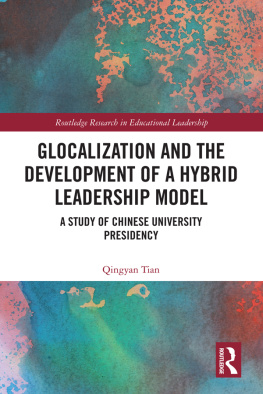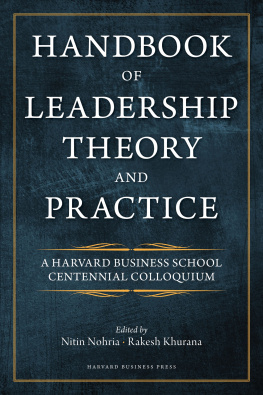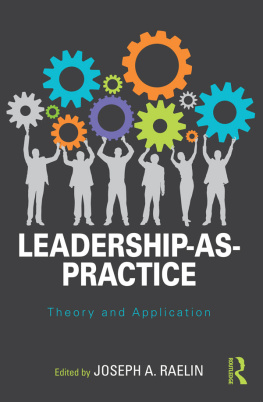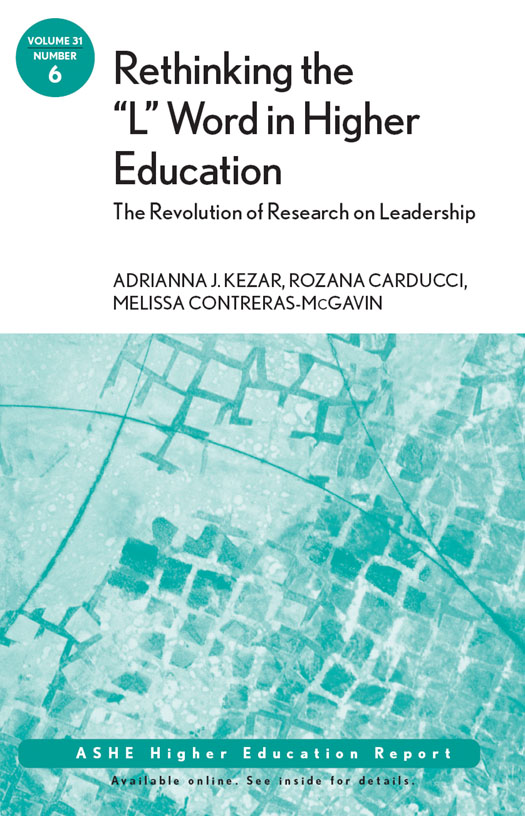Contents

Rethinking the L Word in Higher Education: The Revolution in Research on Leadership
Adrianna J. Kezar, Rozana Carducci, Melissa Contreras-McGavin
ASHE Higher Education Report: Volume 31, Number 6
Kelly Ward, Lisa Wolf-Wendel, Series Editors
Copyright 2006 Wiley Periodicals, Inc., A Wiley Company. All rights reserved. Reproduction or translation of any part of this work beyond that permitted by Sections 107 or 108 of the 1976 United States Copyright Act without permission of the copyright owner is unlawful. Requests for permission or further information should be addressed to the Permissions Department, c/o John Wiley & Sons, Inc., 111 River St., Hoboken, NJ 07030; (201) 748-8789, fax (201) 748-6326, www.wiley.com/go/permissions
ISSN 1551-6970 electronic ISSN 1554-6306 ISBN 0-7879-8677-1
The ASHE Higher Education Report is part of the Jossey-Bass Higher and Adult Education Series and is published six times a year by Wiley Subscription Services, Inc., A Wiley Company, at Jossey-Bass, 989 Market Street, San Francisco, California 94103-1741.
For subscription information, see the Back Issue/Subscription Order Form in the back of this volume.
CALL FOR PROPOSALS: Prospective authors are strongly encouraged to contact Kelly Ward (). See About the ASHE Higher Education Report Series in the back of this volume.
Visit the Jossey-Bass Web site at www.josseybass.com .
Advisory Board
The ASHE Higher Education Report Series is sponsored by the Association for the Study of Higher Education (ASHE), which provides an editorial advisory board of ASHE members.
Melissa Anderson
University of Minnesota
Denise Green
University of Illinois
James Fairweather
Michigan State University
Jerlando Jackson
University of Wisconsin
Kevin Kinser
University of Albany
Sara Donaho
Student Representative
J. Douglas Toma
University of Georgia
Adrianna J. Kezar
University of Southern California
Executive Summary
In these times of change and challenge in higher education, pleas for leadership have become frequent and repeated. But the type of leadership required in this new context of globalization, demographic changes, technological advancement, and questioning of social authority may require different skills and thus reeducation of campus stakeholders if they want to be successful leaders. In the past twenty years, a revolution has occurred in the way leadership is conceptualized across most fields and disciplines. Leadership has moved from being leader centered, individualistic, hierarchical, focused on universal characteristics, and emphasizing power over followers to a new vision in which leadership is process centered, collective, context bound, nonhierarchical, and focused on mutual power and influence. This book summarizes research and literature related to new concepts of leadership to inform practice.
This change in conceptualizing leadership has occurred as new paradigms and theories have been applied to the study of leadership. In particular, social constructivism, critical, and postmodern paradigms have made the context and process much more important to the study of leadership, meaning making, and power. In addition, new theories highlight new aspects that expand our view such as transformational leadership, chaos and complexity theories, social and cultural theories, contingency theories, and relational or team theories of leadership. As a result, leadership researchers and practitioners are now beginning to understand the incredible complexity of organizations and global societies where contemporary leadership takes place, underscoring the need for more adaptive, systems-oriented approaches to leadership that enhance cognitive complexity through learning and team leadership. Researchers have called attention to the significance of leaders being culturally intelligent and able to understand the perspective of those from different races, cultures, and ethnicity. Leaders need to hone their ability to work in groups and to become more artful at reading organizational and historical contexts.
The application of new paradigms and theories in leadership research has resulted in the emergence of new leadership concepts that are now a major focus of researchethics or spirituality, collaboration or partnering, empowerment, social change, emotions, globalization, entrepreneurialism, and accountability. Spirituality has long helped to drive leaders and provide a foundation for understanding leadership. Emotions have also long been a part of leadership as one of the key ways to influence and connect with people as leaders. What is new is the emphasis on studying and providing empirical evidence of the importance of ethics and emotions in leadership. Conceptualizing leadership as aligned with social movements also has a long history, even if this history has not been emphasized in recent years, as it does not support the prevailing dominant ideology of the profit-making sector and industrial military complex. Leadership has always been part of the great story of social evolution, however, helping to empower individuals and create social change. Yet the emphasis on empowerment and social change in formal institutions such as organizations, colleges, and universities is a newer affiliation. Although people disagree as to whether globalization is a wholly new concept, todays world does seem to represent some new challenges for leaders who may find themselves interacting with people from many different cultures in a world where power is distributed differently among countries. And although leaders throughout history have been entrepreneurial, taking risks, and working toward transformation, what is new is that leaders more generally are being called on to be entrepreneurial as well as accountable to a broader set of stakeholders.
Most of the theories that have emerged in the general leadership literature have been applied to the context of higher education, with the exception of chaos theory. Cognitive theories represent a rich area with a significant body of data to guide practitioners, whereas the higher education community needs significant research related to chaos theory, transformational leadership, and the link between learning and leadership. In general, higher education research and practice have indeed experienced a revolution in the way leadership is conceptualized. No longer is the college president considered the sole leader on campus or the campus hierarchy the place to look for change agents. Instead, both practitioners and researchers realize that leadership is a collective process found among many different individuals and groups on campus, usually involving the work of teams and collaboration. Moreover, leaders themselves are conceptualized quite differently. Task orientation is no longer seen as more important than developing relationships and being a strong communicator. Effective leadership is a combination of relational and task skills and involves both transformational and transactional qualities. Successful leaders need to develop cognitive complexity and become skilled in acting as symbolic leaders, become politically savvy, maintain attention to goals and objectives, and build strong relationships on campus. They must recognize that leadership takes place in a particular context that has a culture they need to learn and with which they must align their leadership practices. Leaders who foster learning can create change. Our conceptualization of leadership now embraces an understanding of the way culture affects leadership, the importance of leaders developing cognitive complexity, the impact of leaders and followers mental models on the leadership process, and the effect of leaders background and experience on their views and behavior as leaders.











